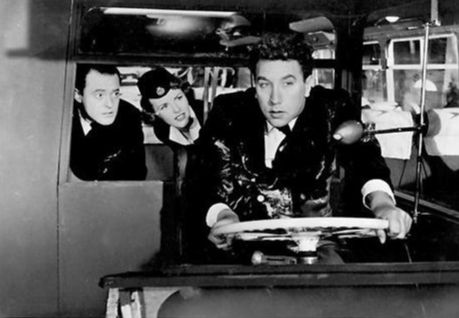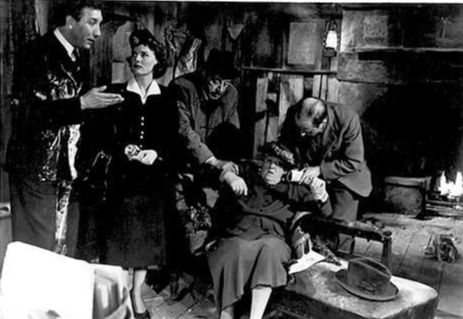The Runaway Bus (1954)
- Soames Inscker

- Nov 1, 2025
- 5 min read

The 1954 British comedy–thriller The Runaway Bus stands as a fine example of post-war British studio filmmaking at its most inventive and unpretentious. Directed and written by Val Guest and produced by Marble Arch Productions for the Rank Organisation, the film blends farce, suspense, and a touch of absurdity into an engagingly eccentric romp. Boasting an impressive cast led by Frankie Howerd, Margaret Rutherford, and Petula Clark, The Runaway Bus succeeds in turning a low-budget premise into a tightly executed and delightfully quirky piece of entertainment that helped cement Howerd’s reputation as one of Britain’s leading comic talents.
The story unfolds at Heathrow Airport (then still known as London Airport) during a period of heavy fog that has brought all air traffic to a standstill. The situation creates chaos for passengers and staff alike, providing a suitably chaotic backdrop for the film’s blend of comedy and intrigue.
Amidst the confusion, it is revealed that a consignment of gold bullion, worth a fortune, is to be transported by road for safekeeping. The responsibility for this task falls to an apparently ordinary airport bus and its unassuming driver, Percy Lamb (Frankie Howerd). Lamb, a nervous and none-too-bright character, soon finds himself ferrying a curious group of stranded passengers on what should be a routine journey to another terminal — but turns into a far more perilous adventure.
The motley passengers include the eccentric Miss Monica Teasdale (Margaret Rutherford), a dotty spinster with a nose for trouble; beautiful stewardess Mary (Petula Clark), whose presence provides both glamour and warmth; and a variety of suspicious travellers, each behaving oddly enough to suggest they may not be what they seem. Unbeknownst to Lamb, one of them is part of a criminal gang intent on stealing the gold.
As the fog thickens and the bus becomes lost in the English countryside, a series of comic misunderstandings, near-misses, and revelations unfold. The vehicle becomes stranded, tempers flare, and paranoia rises — until it becomes clear that someone aboard has sinister motives. What begins as a farce of inconvenience gradually evolves into a light-hearted whodunnit with an almost Hitchcockian undercurrent of suspense, though always filtered through a lens of distinctly British humour.
Frankie Howerd, in his first major screen role, carries the film with his trademark blend of exasperation, self-pity, and sly comic timing. His portrayal of Percy Lamb — the reluctant hero thrust into chaos — plays perfectly to his established stage persona: the put-upon everyman who moans his way through crisis after crisis. Howerd’s ability to turn panic into hilarity is central to the film’s charm, and his nervous asides and facial expressions anticipate the style that would later make him a household name on television.

Margaret Rutherford, as Miss Teasdale, provides a delightful foil to Howerd’s bumbling energy. Her combination of eccentricity, curiosity, and moral rectitude is pure Rutherford — the kind of performance that made her one of Britain’s most beloved character actresses. She brings an air of whimsical dignity to the proceedings, grounding the more farcical moments with her inimitable sense of comic timing.
Petula Clark, then transitioning from child star to adult actress, delivers a bright and sympathetic turn as the resourceful air hostess. Her chemistry with Howerd adds a gentle note of warmth amid the absurdity, and she exudes a confidence that hinted at her later success as both an actress and international singing star.
The supporting cast, which includes George Coulouris, Toke Townley, Terence Alexander, and Belinda Lee (in an early appearance), all contribute memorably to the ensemble. Each plays their part with just enough exaggeration to maintain the film’s comic tone without slipping into parody.
Val Guest, a versatile filmmaker who later became known for his work on The Quatermass Experiment (1955) and The Day the Earth Caught Fire (1961), handles the material with a sure touch. His direction combines brisk pacing with a keen understanding of comic rhythm. Guest makes effective use of confined spaces — particularly the bus itself — to heighten both tension and humour, turning the cramped setting into a microcosm of British eccentricity under pressure.
The film’s black-and-white cinematography, by Arthur Grant, adds to the atmosphere. The fog-bound airfield and bleak countryside create an unexpectedly eerie backdrop that contrasts delightfully with the comic dialogue and performances. This blend of suspense and comedy, handled without excess, gives the film a distinctive tone — one that foreshadows later British “comic thrillers” such as The Ladykillers (1955) and Two-Way Stretch (1960).
Despite the modest budget, Guest’s direction ensures the film looks polished and cohesive. The fog, far from being a limitation, becomes almost a character in itself — a metaphor for confusion, secrecy, and British stoicism in the face of muddle.
What distinguishes The Runaway Bus from many of its contemporaries is its sly, understated humour. Rather than broad slapstick, it relies on verbal wit, character quirks, and situational absurdity. Howerd’s stream of anxious commentary — constantly breaking the fourth wall with exclamations of “Oh, please yourself!” and other self-deprecating remarks — anticipates the comedic style that would define his later television career.
The film also satirises the stiff-upper-lip mentality and bureaucratic inefficiency of post-war Britain. Its characters, from officious airport staff to unflappable passengers, embody the peculiar resilience and muddle-headedness of the British public in times of crisis. Even the criminals are portrayed with a certain comic incompetence, ensuring that menace never outweighs mirth.
Beneath its light-hearted exterior, The Runaway Bus contains subtle reflections on post-war British identity. The fog, the stranded travellers, and the sense of uncertainty all evoke a nation emerging from the confusion of wartime into the ambiguities of peace. The mix of classes and personalities aboard the bus — from the working-class driver to the genteel Miss Teasdale — mirrors the social cross-section of Britain itself, forced into cooperation amid adversity.
There is also a clear sense of the film celebrating ordinary heroism. Percy Lamb, timid and flustered though he is, ultimately proves resourceful and courageous. His triumph is less about bold adventure than about muddling through — a distinctly British version of heroism that resonated with audiences of the time.
The musical score by Ronald Hanmer provides jaunty, upbeat accompaniment, helping to maintain the film’s comedic tempo without undermining its moments of suspense. Editing by Douglas Myers keeps the narrative brisk and cohesive, ensuring the story never lingers too long in one place. Despite its limited scale, the film moves with efficiency and confidence — a testament to the professionalism of Britain’s mid-century studio system.

Upon release, The Runaway Bus was well received by both critics and audiences. It was praised for its clever script, tight direction, and standout performances — particularly that of Frankie Howerd, whose film career was launched by its success. The film was modest in ambition but proved a box-office hit, leading to further opportunities for its cast and director.
Today, The Runaway Bus occupies a fond place in the pantheon of British comedies of the 1950s. Though less frequently cited than Ealing’s more famous productions, it shares their wit, craftsmanship, and social observation. It also remains notable for showcasing Petula Clark and Belinda Lee early in their careers, and for providing one of Margaret Rutherford’s most charming comedic turns outside her later Miss Marple fame.
The Runaway Bus (1954) is a masterclass in economical filmmaking — a tightly woven mixture of farce, suspense, and character comedy that encapsulates the charm of mid-century British cinema. With its fog-shrouded setting, engaging ensemble cast, and deft balance of tension and humour, it offers a viewing experience that is both nostalgic and genuinely entertaining.
Frankie Howerd’s performance gives the film its comic heart, Margaret Rutherford adds eccentric sparkle, and Val Guest’s direction keeps the whole affair brisk and buoyant. It is not merely a curiosity from the early days of British comedy, but a confident, clever piece of storytelling that proves ingenuity can triumph over budgetary constraint.
More than seventy years later, The Runaway Bus still runs on time — a funny, atmospheric, and thoroughly British journey worth taking again.






